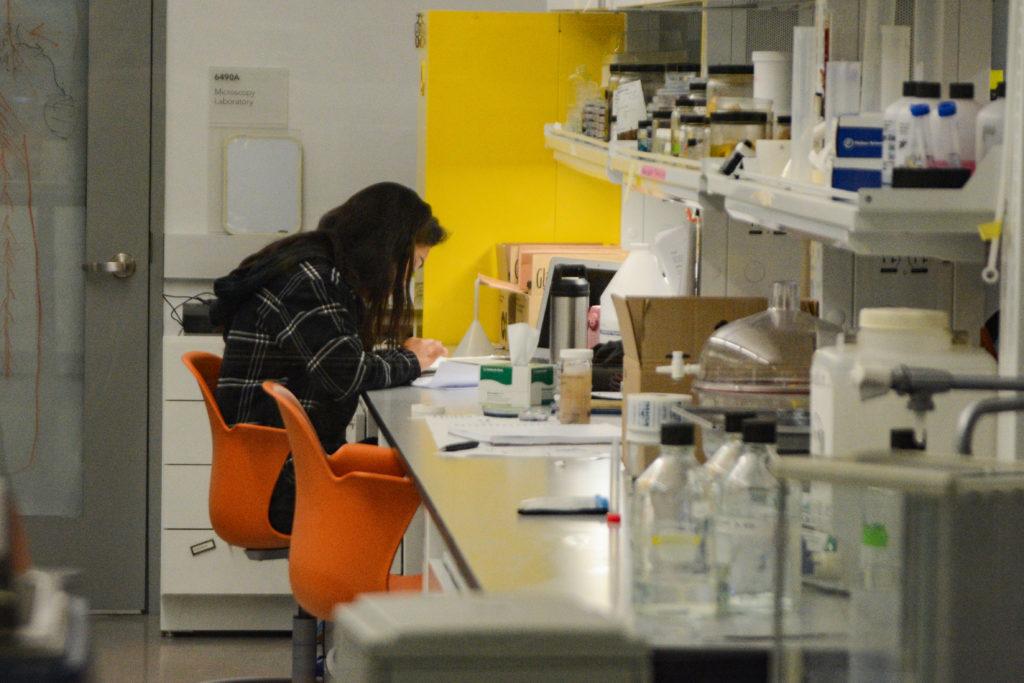For Leo Chalupa, the vice president for research, it starts with students having the courage to speak up and ask.
An undergraduate student that has excelled in a course or become engrossed in its subject matter asks a professor if they can help out in the lab or do research for a book. If the faculty member has an opening, Chalupa said it can transform the student’s college experience, giving them valuable practical experience and a mentor who may help them find a job or be more prepared for graduate school.
“You’ve got to get in there and say, ‘excuse me, do you have an opening in your lab? Can I help out?’” he said. “You can’t wait for somebody to say, ‘would you like to possibly work in my lab?’”
This is the type of interaction the research office wants to promote as it makes increasing the number of undergraduate students involved in research one of its top goals this academic year. Faculty and experts said including undergraduate students in research bolsters the University’s research reputation and gives undergraduates a leg up on other students when looking to apply for graduate school and future job prospects.
“The goal should be that any undergraduate that wants to be associated with scholarship or research should have that opportunity, this should be open,” Chalupa said. “If you’ve spent four years here and haven’t had that kind of experience, that’s bad, we’re not doing what we should be doing.”
“I know that research is really intimidating to a lot of people so it’s hard to send that first email to a professor when you have no experience.”
He said it’s difficult to rank how GW compares to other universities on undergraduate involvement in research projects, but the research office has identified it as an area of improvement for the University.
He said he plans to speak to the deans of different schools and drum up faculty support this academic year for undergraduates participating in research. Chalupa said he would be in conversation with University President Thomas LeBlanc about how to make research opportunities a part of his drive to improve the undergraduate student experience.
The effort would include raising awareness of existing resources like the Center for Undergraduate Fellowships and Research, which offers advising to help connect students to projects and doles out scholarships like the GW Undergraduate Research Award. This award gives a $5,000 grant to fund a research project for an undergraduate student and a $1,000 stipend to a faculty mentor, he said.
Keith Crandall, a professor of biology and the director of GW’s Computational Biology Institute, said there needs to be a culture shift at the University where faculty and officials make a sustained effort to advertise opportunities for undergraduate students.
“As we move more towards a research University, because we have this strong focus on undergraduates, it’s a natural marriage to get the undergraduates in the lab doing the research,” Crandall said. “We can really promote that concept of a central resource for providing mentoring funds.”
Officials made integrating undergraduates more closely with faculty-sponsored research a part of the strategic plan and a piece of the overall mission of burnishing the University’s reputation as a destination for top researchers across fields.
Maggie Steiner, a sophomore majoring in applied math who works on HIV research in Crandall’s lab, said she was successful in finding an opportunity. She added that the University should do more to promote these positions by encouraging faculty to mention them in class and posting them online as job openings.
“I don’t think there’s any lack of opportunities at the school, I think it’s just that students aren’t necessarily taking advantage of them as much as they could be,” Steiner said. “I know that research is really intimidating to a lot of people so it’s hard to send that first email to a professor when you have no experience.”
“No one ever really told me that it was an option, that I could potentially work under someone in the medical school or the hospital or anything.”
Research jobs are posted in Handshake, GW’s new job search database that launched at the University over the summer.
Paula Moszczynski, a sophomore majoring in biology who works in a microbiology professor’s lab on HIV research, said she only found a position after emailing numerous professors in the medical school and the Columbian College of Arts and Sciences. She said the position has helped prepare her for enrolling in medical school after graduation.
“No one ever really told me that it was an option, that I could potentially work under someone in the medical school or the hospital or anything,” Moszczynski said. “I didn’t really know that that was an option.”
Experts said undergraduates need to be involved in some type of research project to better prepare them for jobs post graduation and universities need to make these opportunities more visible to undergraduates.
Janet Morrison, a professor of biology at the College of New Jersey, said the number of undergraduates participating in research projects over the past 20 years has been growing as more faculty see the value in training undergraduates before their graduate education.
She said this kind of work as an undergraduate can help students develop skills in critical thinking, troubleshooting, teamwork and effectively communicating a study’s results.
“If you haven’t had that, I think you’re starting to be somewhat at a disadvantage,” Morrison said. “It’s really becoming much more standard than it used to be.”
Kathryn Sheehan contributed reporting.



